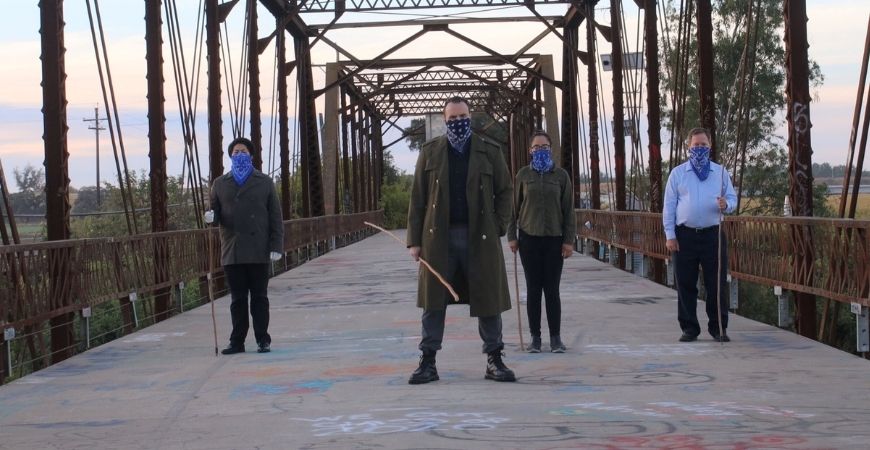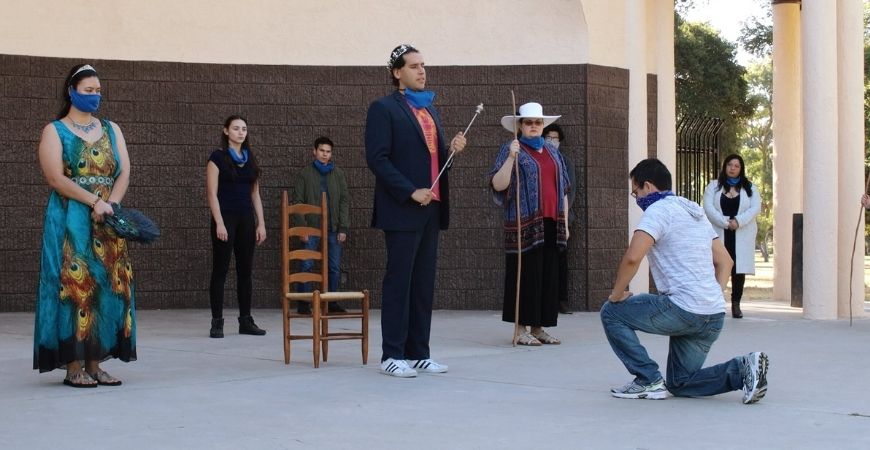
UC Merced undergraduate students and faculty partner with Merced Shakespearefest to produce the bilingual, English-Spanish Shakespearean web series Ricardo El Segundo (Richard II). The production’s origin lies within Ph.D. candidate William Wolfgang’s idea to bring a bilingual Shakespearean show to the Central Valley, in an effort to bridge cultures together through the iconic playwright’s social justice activism.
Director Wolfgang embarked on this journey when pitching the show Ricardo II to Merced Shakespearefest’s founder and artistic director Heike Hambley.
“I was working with Heike last summer and she was planning to do Richard II... she offered for me to direct it. I connected [the show] with some bilingual aspects of a production that was performed by co-founder of Shakespeare in Yosemite, Dr. Katie Brokaw of UC Merced” explained Wolfgang.
The Ph.D. candidate from the University of Warwick (UK) implements themes of grassroots theater by speaking on topics such as political turbulence and the history of California. Adaptations to the original Shakespearean text were vital to the success of creating a script that is equally half English, half Spanish.
“50% English, 50% Spanish was a way to balance each scene so that no matter which language, even if you were only monolingual, you will have a story to follow- and you should understand that story exclusively,” Wolfgang expressed.

Co-adaptor and translator Angel Nuñez is a recent graduate of UC Merced and Global Arts major. Nuñez worked as the primary translator for the production, creating sophisticated Spanish translations of Shakespeare’s original text from Richard II, in addition to producing Spanish and English subtitling translations for each episode.
Maria Ngyuen-Cruz, also a recent graduate of UC Merced’s English Department, holds the role of production manager for Ricardo II. Ngyuen-Cruz worked as a co-adaptor of the script, emphasizing the metatheatrical components of the play. Additionally, Cathryn Flores, a third-year English major at UC Merced, used her home studio in the Bay Area to compose the musical scoring for the series and also authored the theme song. Flores’ compositions are influenced by modern Latin instrumentals and electronic music.
As the COVID-19 pandemic ensued, Merced Shakespearefest’s fall show moved to online rehearsals through the virtual platform of Zoom Video Communications. For two weekends in June 2020, the Ricardo production cast and crew filmed the series socially-distant and in compliance with COVID-19 safety protocols. Episode filming took place at various locations including the UC Merced campus, Merced Open Air Theater (MOAT), and Multicultural Arts Center (MAC).
The show’s cast is composed of amateur and seasoned actors from surrounding Central Valley cities, UC Merced undergraduates, and university faculty. Alejandro Gutierrez, Professor of Mechanical Engineering at UC Merced, makes his acting and on-screen debut as King Ricardo.
Director Wolfgang emphasizes the need to keep ideals of Grassroots Shakespeare at the core of the production’s script, rehearsals, and performance.
“Doing a project like this is only logical if it is truly serving a need in your community. If you have a population that has a connection to another linguistic heritage, Shakespeare can be that meeting place to bring these cultures together,” advised Director Wolfgang.
Ricardo II’s mission to advocate for the inclusion of cultures and ethnic backgrounds within the arts coincides with the UC Merced Arts mission.
Kim Garner, Executive Director of UC Merced Arts, expressed “this [production] will inspire people that have never thought about acting, reading or performing Shakespeare. This adaptation will resonate with faculty, students, and staff in away that traditional Shakespearean theater could not have. Truly an inspiration for the future of theatre in Merced.”
LINK TO EPISODES HERE.
Article by Cathryn Flores



